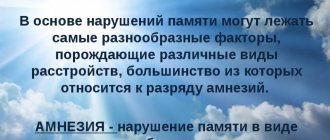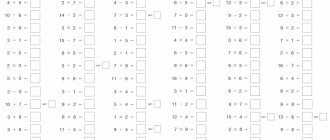Memorizing tricks and methods
We can find many works describing techniques and methods that facilitate the process of memorization.
Danielle Lapp described the main ones: Awareness - consciously use emotions and feelings when memorizing poetic lines. Each person has their own characteristics and abilities. As for memory, depending on which sense organ is most developed in memorization, the predominance of visual, auditory or motor memory is distinguished. This fact should be taken into account when mastering the poem.
Poems for memory development can be read, recorded on a tape recorder, listened to, or recited, accompanied by gestures and facial expressions. Association of images - poems that develop memory should be taught using associative images, the choice of which depends on the individual needs of each person. Using a pause allows you to reflect on what you have learned and identify what is most important. Personal commentary - poems for memory are better absorbed by identifying feelings and impressions from reading them. Organizing material into categories - simply put, the text needs to be divided into semantic parts and memorized in order. Relaxation. Learning poetry to train your memory in a depressed mood is useless, so positive emotions are also a very important condition for achieving success.
It is better to memorize poems in the morning, when both performance and mood are good. When reproducing them, gaps may arise, then you need to intensify the remembering process. To do this, you need to breathe deeply, look around, relieving tension, and focus on remembering. Repetition and frequent use are the key to quick recall.
Many people ask the question: “What verses should I learn to train my memory?” As mentioned above, it is better to choose those works that you have not read. Get acquainted with the works of unknown poets and choose what you like. If, for example, you are inspired by M. Tsvetaeva, try reading V. Mayakovsky.
There are also specially created mnemonics - these are poems for improving memory in adults, which are based on the principle of mnemonics. Mnemonics is a system of methods and techniques for memorization that allows you to store and retrieve necessary information from memory.
Mnemonics for memorization
Do you know what these verses are for remembering:
"You just have to try
And remember everything as it is:
Three, fourteen, fifteen,
Ninety-two and six"?
That's right - this is the number Pi - 3.1415926...
This verse allows one to apply the mnemonic principle of memorization, thanks to which a person can store and at the right time retrieve complex sequences, lists, and information clusters from memory.
For example, another option for remembering complex rules.
Conjugation of verbs that do not conjugate with “e”, all exceptions are summarized in one rhyming stanza:
“Chase, hold, look and see,
Breathe, hear, hate
And offend and endure,
And depend and twist.”
Although regular training by memorizing any poems allows you to accustom your brain to processing information and activate your memory potential. But to make the process more efficient, you need to know about some tricks.
A complex approach
Music to improve brain performance and memory development
To maintain a high tone of memory and the entire brain as a whole, the load must be constantly increased. And also develop some functions with the help of others. Specially designed Vikium online simulators are suitable for this. They are built in training in such a way that your strengths become a support for the development of your weaker ones. An adaptive algorithm tracks your daily progress and gradually increases the load to prevent degradation
The peculiarity of this training is that it involves three main functions of the brain - attention, memory and thinking. Overall productivity, the operation of other functions, as well as our ability to learn depend on them.
Thus, by training your brain for just 15 minutes a day, you can greatly improve its performance. This will allow you to master new skills, absorb information faster, become more productive and improve the quality of your own life.
Source
How to teach poems to an adult?
How to use music to develop your brain and memory
There are several learning methods, but the classic scheme is more popular:
- Start memorizing a few (2-3) days before the due date;
- Read the text several times in a row, preferably out loud - this will add sound perception to the visualization;
- Present the images and events described in the work. If possible, even sketch it;
- Identify the main characters in the poem and feel the feelings that the author seeks to convey;
- Rewrite the text on paper, this will enhance visual perception;
- Slowly read the poem out loud again, remembering the forms of the words and their tense;
- Start memorizing using the “snowball” principle: memorize the first line, then the first 2 lines, then the first 3, etc.;
- Make a cheat sheet from the first letters of the lines.
Accelerated learning technique
Music to improve brain function and memory in adults and children: 15 hours of the best compositions
Many people complain that they have a very bad memory and, no matter how hard they try, they can’t learn a poem. For such cases, a special method was developed:
The text must be read aloud at least 2-5 times. Try to imagine what the author described
The association method is very effective and makes it easier to remember not only poetry, but also English words, important material, and anything else. Now read the text again, but this time very slowly, concentrating on each word used. Next you need to rewrite the text by hand. This also allows you to speed up the process of memorizing the poem. At the end, take the text written down on the sheet with your own hand and repeat the first line several times
Then you can add a second line, repeat it along with the first, etc., adding a line over and over again.
Benefits of Studying Poetry
When a person has no motivation to do something, it will be very difficult for him to force himself to start completing the task. Therefore, first you need to understand why memorizing poetry was included in the school curriculum. The following benefits can be noted:
- Studying poetry is an effective method of improving memory, and it is completely free.
- This method allows you to expand your horizons, gain new knowledge and feel the spirit of poetry. Moreover, for these purposes you can study not only Baudelaire’s “Flowers of Evil”; the familiar “Borodino” by Lermontov and Krylov’s fables are perfect.
- People who learn poetry develop creative abilities.
- This method has been effectively used for teaching acting for many years.
- Knowledge of poems will allow you to become the life of the party. A person who can insert poetic quotes into a conversation arouses interest and admiration.
- And of course, studying the vocabulary of the classics allows you to expand your own vocabulary and makes your speech more expressive.
How to improve memory with poetry
It explains why it is useful to memorize poetry, how to choose poems for this, how to teach children to learn poetry, and a method for memorizing poetry.
Why is it useful to memorize poetry?
Systematic memorization of just a few lines of poetry contributes to the formation of new neural connections that expand memory and develop intelligence.
In addition, as a pleasant bonus, memorizing poetry:
- develops speech;
- improves diction;
- develops oratory skills;
- eliminates communication complexes;
- makes speech more varied;
- improves intonation.
How to choose verses to memorize
As poems to improve memory in adults, it is recommended to pay attention to classical works, in particular: W. Shakespeare, A
Pushkin, S. Yesenin, V. Mayakovsky, B. Pasternak, I. Severyanin, S. Yesenin.
As you know, some people perceive information more easily visually, while others perceive it aurally. The poems of famous classical poets are distinguished by their clear, intelligible meaning.
The main thing is to choose poetry that you like.
To develop children's memory with the help of poetry, when selecting poems, they should be understandable to the child and correspond to his level of development.
In this case, you should choose poems for children according to their age category:
- up to 4 years (mainly contain nouns and verbs, for example, poems about a cloud; about the sun; about a ball);
- from 4 to 6 years (contain abstract quantities and phenomena, adds motivation for memorizing poems: for example, for a matinee, for mother, for the New Year);
- from 6 years (the content of poems becomes more complex, analysis of objects is added to memorization).
The development of memory in children is best suited mainly to the works of famous authors: F. Tyutchev, I. Krylov, S. Mikhalkov,
K. Chukovsky, A. Barto, E. Uspensky, S. Marshak, B. Zakhoder
.
There are several methods for memorizing poetry.
If you want to memorize poetry, proceed according to the appropriate classical method, that is, as follows:
- start memorizing 2-3 days before the performance;
- read the text repeatedly, this will allow you to combine visualization with audio perception;
- imagine the images and events described in the poem, if possible you can make sketches;
- highlight the main characters of the poem, imbued with their feelings;
- rewrite the text of the poem on paper, this will enhance visual perception;
- re-read poems out loud;
- start memorizing the poem using the “snowball” method: memorizing first the first line, then the first two lines; then the first 3 lines, etc.;
- make a cheat sheet consisting only of the first letters of the lines of the poem.
While memorizing poetry, you can spy on individual words, but you should not strive to learn the entire text at once.
Scientists and practitioners say that poetry is best remembered if you learn it out loud, because audio information is perceived by the brain just as well as visual information, or even better.
How to teach children to learn poetry
To teach a child to learn poetry, it is important to know that sometimes children can be capricious and refuse to memorize poetry. Therefore, when working with them, you must adhere to the following recommendations:
Therefore, when working with them, you must adhere to the following recommendations:
- start introducing your child to poetry from a very early age;
- select poems appropriate to the child’s level of development and age;
- make sure that the memorization of poetry occurs emotionally and with expression;
- promptly introduce the child to words he does not understand;
- repeat poems often to your baby or with your baby during walks.
It is recommended to illustrate poems for memory development on your own or together with your child; this will turn the process of memorizing poems into an exciting game.
It is advisable to motivate the child, for example, by saying that with his performance he will please his loved ones or surprise his friends.
Young children should buy books with good, bright, positive illustrations.
Source
Recommended Poems
For those who do not know which verses to choose to improve their memory, some recommendations can be given. Collections of poems by the following authors are suitable for children: A. Barto, K. Chukovsky, E. Blaginina. For older children, we can recommend the poems of A. Pushkin, M. Lermontov, F. Tyutchev, M. Tvardovsky.
Adults can try to learn excerpts from the poems “Eugene Onegin” or “Count Nulin” by A. Pushkin. Works by V. Mayakovsky, A. Fet and other famous authors are also suitable.
Regularly learning poetry will help not only train your memory and thinking, but also increase your erudition.
Recommendations
Adults show willpower to memorize poetry, but children may resist this process. The child must get used to poetic speech and be able to perceive it. To work with children, you need to adhere to the following recommendations:
- it is necessary to introduce poetry from infancy;
- rhymed works should be repeated during walks and various games;
- you need to recite poetry expressively, with emotional inspiration;
- the selected material must correspond to the age of the little person;
- the baby should understand all the words;
- It is advisable to illustrate poetic texts with drawings.
It is recommended to start memorizing the poem a few days before the required deadline. It is necessary to highlight the main characters, to be imbued with the feelings and emotions of the poet. Vivid presentation of images and events enhances perception and memory. Effective memorization is facilitated by copying stanzas onto a piece of paper, slowly reading rhymed phrases, and facial and gestural accompaniment.
Some experts recommend making a cheat sheet in which only the first letters of all lines are depicted in a column. It is proposed to use the “snowball” principle, when memorization is carried out through an increase. First, remember the first line, then the 2 initial lines, then 3 and all subsequent lines in total.
Exercises for memory development in preschool children
Since a small child does not set himself the task of remembering something consciously, this process occurs spontaneously, against his will. Therefore, it is much easier for a preschooler to record in memory what evokes strong feelings and emotions. Experts recommend presenting attentiveness tasks in a playful, entertaining form.
Since thinking and memory are closely related at a young age, such activities train ingenuity, intelligence, and logic. Exercises for the brain of preschoolers should develop all types of memory: visual, auditory, motor, figurative and verbal. As we grow older, involuntary memorization is replaced by logical thinking, and both hemispheres of the brain are involved.
Exercises for preschoolers:
- Remember the sound. A game for developing memory, when an adult invites the child to voice this or that phenomenon. For example, how a cat meows, the wind blows, rain knocks on the roof, a fly buzzes. To diversify the game, you can invite the child to change places and give tasks himself.
- Association game. The parent or teacher reads to the preschooler pairs of words that are related in meaning (for example, winter - snow, pen - notebook, spoon - lunch, tree - forest). At the next stage, only one word is pronounced, and the child, by association, must name the second.
- Draw and remember. The adult names objects that are well known to the preschooler (chair, house, scooter, sun), and the preschooler must quickly sketch them. The drawing should subsequently help the child name the thing. For children going to 1st or 2nd grade, you can make wishes not only for objects, but also for abstract concepts (walk, sleep, joy).
- Shop game. The child is given the task of shopping in a store; in each department there are several items that he must remember. For example, in the fruit department you need to buy a banana, apple, orange, pineapple and lemon.
- Items in a bag. Things familiar to the child (for example, an apple, a spoon, a spatula, a pencil) are placed in a canvas bag. A preschooler, without looking inside, must determine by touch what is in the bag.
- Incomplete row. 5-10 objects are placed in front of the child, which he must remember in half a minute. Then the preschooler should be asked to turn away and, in the meantime, remove 2-3 things from the table. It will be interesting for the child to guess what items are missing.
- Description of the item. The child is named a thing familiar to him, and he tries to talk about it in detail. The color, shape, smell, taste of the object are important. An adult can ask a preschooler leading questions that will force him to look for new definitions and associations.
Children's poetry for memory development
Memorizing poetry with a child also follows several general recommendations, according to which you should choose poetic works:
- The main requirement is that all words must be understandable to the child and correspond to his level of development. If some of them are unknown to the baby, their meaning should be explained - this will broaden his horizons;
- The poem must be age appropriate. If a work for a 3-4 year old child is filled mainly with nouns and verbs, then at 4-5 years old the poem already contains abstract quantities and phenomena, and motivation is always added - for a matinee, a story to grandparents. From the age of 6, the content becomes even more complex, and text analysis is added to memorization.
Poems for developing memory in children are works by such famous authors as Korney Chukovsky, Agnia Barto, Samuil Marshak, Sergei Mikhalkov, Eduard Uspensky, Boris Zakhoder.
As a rule, children's publications are divided into different ages, making it easier to select suitable texts.
Examples of poems that develop memory for children
- Poems for children under 4 years old About chicks
It's raining, it's pouring everywhere. The chicks are happy in the nest. Mom will stay at home. It won't fly anywhere.About the sheep
Oh, and a fashionable sheep, All in curls, All in rings. Even the horns in front were curled in curlers!
About the cloud
Hello, little cloud! Isn't it boring up there alone? Do you want us to play together? Do you want to read fairy tales? Do you want us to kick the ball? Just be kind, don't cry!
- Poems for children from 4 to 6 years old Swallow's wings flash
The swallow's wings flash in the silver sun; The meadows are filled with flowers, The forests are noisy all around. How happy the swallows are to the sun, How high they soar! The whole blue height rings with their cry of joy.The fields are spread out all around, and there is no end in sight. The rye has risen, is excited, - Space and grace!
Poem about July
The cuckoo's last cry is like an autumn call. The summer chamomile wreath will soon fade. But in the heart, like in a daisy, We will take home the July daisies - Let them shine for us in winter.
A path runs through the meadow
A path runs through the meadow, dives to the left, to the right. Everywhere you look, there are flowers all around, and knee-deep grass. The green meadow is like a wonderful garden, fragrant and fresh at dawn. Beautiful, rainbow flowers. Bouquets are scattered on them.
- Poems for children over 6 years old For mom
The golden sun rolled down like a wheel, the gentle sun turned into a mother, Dear little mother, Mom, smile! With your tender heart, cling to me!Mom is like a sorceress, If she smiles, My every wish comes true!
Mom kisses - Bad things are forgotten. A new day, a fun day begins right away!
About fairy tales
All fairy tales in the world are different, You can always dream about a fairy tale. But in childhood, I tell you, there are fairy tales in reality, friends! Isn't life really a fairy tale? What about reality? Nature's beauty Can't be called a fairy tale? And a fairy tale is kindness!
She will wean us all from being angry, She will teach all people to be friends... Those who avoid fairy tales in life will find it boring to live in the world!
New Year's verse
They say: on New Year's Eve, whatever you want, Everything will always happen, Everything will always come true. Even the boys can have all their wishes come true, they just need to make an effort.
Don’t be lazy, don’t yawn, And have patience, And don’t consider learning as your torment.
They say: on New Year's Eve, whatever you want, Everything will always happen, Everything will always come true.
How can we not make a modest wish - to complete school assignments with “excellence”.
So that the students begin to study like this, So that the two cannot get into their diaries!
The problem of culture
Returning to the unfortunate child who is being tortured by Pleshcheev, a second serious problem is noticeable: the lack of poetic culture (and indeed culture in general). It’s already clear about general culture: the mother doesn’t even react when the child swears in the video for the first time. Let's talk about poetic culture.
The child in the video does not feel the poetic rhythm, gets lost from it, and constantly breaks the line, making it prosaic. This rarely happens to children who have been sung a lot of songs and read poetry from early childhood (by the way, I note that Chukovsky is especially good in this sense, who is usually spanked for terrible, terrible stories; he is good for his extraordinary poetic energy and amazing variety of verse: he unobtrusively introduces a child into the world of Russian poetry, introducing him not only to trochees typical of children’s poetry, but also to dactyls, and amphibrachs, and peons...
The child grows up already saturated with these rhythms; the poems are easily perceived and easily learned. And when this is not the case, trying to learn a poem turns out to be akin to trying to master Tuvan throat singing in one evening. Here's a recording and half an hour of time for homework - try to learn and sing:
Of course, there is verse deafness. Children, when learning long poems, often forget individual words. But some substitute synonyms while maintaining the size - “my uncle had the most honest rules when he was terribly ill,” while others throw out the forgotten word, rearrange the words - and, it seems, do not at all hear what they came up with. “Well, it was day, through the flying smoke the French came like clouds”
In these cases, it is imperative to pay attention to the rhythm, beat it, tap it, chant it - learn to hear poetry
Deafness can also be less pronounced - for example, when reading Pushkin aloud, children, out of habit, read “red-hot” and “hopelessly” as “red-hot” and “hopelessly,” which is why the poems immediately begin to limp. They, of course, know nothing about Church Slavonicisms and do not understand why there should be E instead of E, and they are not even embarrassed by the rhymes of the “hot - Universe” “hopelessly - tenderly”. But what prevents adults from talking to them about this?
So is it worth spending time memorizing poems?
What if you don’t need them in life?
Costs. The intellect developed with the help of poetry will help a person accumulate useful information that will help in achieving his goals.
A rich vocabulary and good diction will provide an invaluable service in establishing relationships with people, as well as in personal growth.
B. Pasternak's poem is about this. (Can you learn it?)
That's how they start. About two years old melodies burst forth from the mother into the darkness, chirping and whistling, and the words appear about the third year. This is how they begin to understand. And in the noise of the running turbine, it seems that the mother is not the mother, that you are not you, that home is a foreign land. What should a terrible beauty do, sitting on a lilac bench, when she really shouldn’t steal children? This is how suspicions arise. This is how fears grow. How will he let the Star exceed his reach, When he is Faust, when he is a fantasist? This is how the gypsies begin. So the seas open, floating above the fence, where homes would be, suddenly, like a sigh. This is how the iambs will begin. So the summer nights, falling face down in the oats with a prayer: be fulfilled, Threaten the dawn with your pupil, So they start quarrels with the sun. This is how they begin to live in verse.
Development of memory by memorizing poetry
The process of memory training in children and adults is closely interconnected with other types of intellectual-mnestic activity (perception, attention, thinking), poetry is optimally suited for the maximum use of the designated functions. Rhymed, poetic lines are remembered more easily than works in prose
To effectively teach poetry to develop memory in children, adhere to the following principles:
- Careful reading of the verse.
- Understanding the meaning of each word.
- Pronouncing poetic lines out loud, observing pauses, highlighting key points with intonation.
- Humming the text.
- Recording text.
- Application of the method of associative connections.
It is important to simultaneously engage the auditory and visual areas of cortical structures. Perceiving material exclusively by ear involves fewer brain regions in the process of memorization, which is associated with fewer newly formed synaptic connections
If a child reads a poem out loud, the visual and auditory centers of the cortex work.
To better learn poetry to improve memory, methods such as humming and writing are used, which help increase the number of brain areas involved in the process. The construction of associative chains works in a similar way when, when memorizing a poetic phrase, a person simultaneously looks at it, listens to it, understands it and finds in memory objects, images that are suitable and consistent in meaning, taking into account the accumulated cognitive experience.
A person remembers better material that is logically connected with accumulated information. To learn a text easily, it is associated with familiar objects. For example, associations to the line about the forest include clearing, mushrooms, forest edge, forest animals. Associations to the phrase about sports include running, health, tracksuit, awards, competition.
If it is not possible to learn a complex work, they resort to the method of capital letters - the first letters of each poetic line are written on paper. Holding a paper with the initial letters of the phrases in front of your eyes will make it easier to repeat the entire poem. A useful habit is to memorize a new poem every day.
If the list of learned poems is updated daily, mnestic abilities are constantly trained. As a result of regular classes, it will take less time to memorize poems of the same content and equal volume, for example, quatrains. New stanzas after long-term training are memorized after fewer repetitions. The result of learning poetry:
- Memory training.
- Establishing correct diction.
- Replenishment of vocabulary.
- Enrichment of speech with literary, artistic phrases, speech patterns.
- Expanding your general horizons.
If a person is able to recite many poems by heart, he will be able to maintain a dialogue with any interlocutor and will give the impression of an educated, intellectually developed person. By showing off your erudition during an interview, you will be able to earn a few extra points and win a competition to fill a vacant position
When meeting someone, such skills and abilities will make you pay attention
Features of memory formation
The method of memorizing poems is used to develop memory at any age. Understanding the memory process helps improve this function. Memory is the leading cognitive process, the foundation on which mental activity is built. The images that arise during interaction with the external environment would be experienced each time as if they had arisen for the first time if a person did not remember them.
When a person opens his eyes in the morning, he understands where he is. When going to school, college or work, a person realizes why he is doing this. Thanks to the ability to remember, an individual accumulates impressions that arose in the process of interaction with the outside world, learns, acquires skills and abilities to use them in the future. Understanding the function of memory is associated with the theory of physiologist P. Pavlov about conditioned reflex reactions.
For example, if you turn on a colored light bulb while feeding a baby, repeating the process many times, the baby develops a reflex reaction. He makes sucking movements when the light is on, even in the absence of food. The child remembered the relationship with the light of the light bulb, which is due to physiological processes in the brain:
- When feeding, nervous stimulation occurs in the alimentary part of the brain.
- When a light bulb is lit, nervous stimulation occurs in the visual cortex.
- Repeating the process many times leads to the formation of a new neural connection in the brain.
The ability to remember is associated with the activity of parts of the brain, with physiological processes occurring in the central nervous system. For example, when certain parts of the brain are damaged, cognitive abilities, including memory, deteriorate. Moreover, the physiological processes during memorization are identical to the physiological processes that occur during perception (visual, olfactory, gustatory, tactile).
The difference is that during perception, physiological processes are supported by current external stimuli (irritation of receptors); when reproducing information from memory, the factor of excitation of nervous structures is the nervous processes that occurred in the past. Repeating the material multiple times allows you to remember it accurately.
Activities aimed at memorizing and subsequent reproduction of information are called mnemonic. If you regularly learn poetry, memory develops in adults and children; memorizing complex words and phrases is useful for training the brain structures responsible for mnemonic activity. These include the hippocampus, thalamic sections of the reticular formation, auditory and visual centers of the cortical layer.
Poems and attention
Memory without the ability to quickly concentrate does not develop. Remember when you were in school or university, you needed to memorize relatively large amounts of educational material
You forced yourself, concentrated, and learned the material with varying degrees of success. But why was it all forgotten? But because when we taught, we retained unpleasant emotions and associations. We were waiting for this torment to end.
What happens when we have learned a poem we like? We don't say it under our breath every day. The moment or the right opportunity comes, we are overcome with feelings, we remember the lines of poetry. At this moment we do not ask ourselves whether they were in long-term memory or short-term memory. We remembered - that’s all
What was our focus? On the moment, feelings, associations, and the memory worked
In addition, the poems touch on the entire list of necessary “tools” of perception:
attention; visualization; sense organs (smell, taste); analysis; logic; associative series; thinking; hearing.
Techniques
Have you ever heard or perhaps seen in films how an intelligence officer, having glanced at a document or a secret scheme, remembered it instantly? Do you think this is a myth? But no. Everyone has such an amazing ability. This has long been established by science, and is used to train intelligence officers.
For example, this: a person can simultaneously perceive (remember) 7 blocks of 7-8 words. In addition, poems are taught by stanzas, not by sentences or rhymes.
When memorizing, it is important to use the articular apparatus and recite the entire stanza out loud - this will affect auditory memory. It is important to pause for 4 seconds between stanzas - this allows you to comprehend what you read, associate, develop an attitude towards what was written, and engage emotions
Not all poems are divided into stanzas, or not everything that we need to remember falls under poetic rhythm and is divided into blocks. In addition, if you need to remember a digital series, it is difficult to use the entire set of triggers (an event or factor that causes a certain reaction).
In this case, try another method: number each word in the poem, read it several times, saying the number out loud. Ask someone to name individual words from a verse, and you, without peeking, name its number.
Try this guide to practice
Pay attention to your attitude towards what is written. Read 2-3 times and retell as you remember, focusing on your perception
If you do this for a week, you will notice improvements every day. However, this is still not enough.
To develop mnemonic abilities, you need to use not only poetry, but also games, pictures, and logical deduction tasks.
Memory efficiency
The effectiveness of memorizing poetry depends on the individual characteristics of information perception. Visual learners who predominantly perceive information through visual channels will more easily perceive and remember lines from printed text in a book.
An audio medium, such as a telephone, or reciting a poem out loud will help auditory learners master the text faster: it is easier for them to remember what they hear than what they see. Pantomime and gestures are aids in memorizing material for people with developed motor memory.
Modern technologies with applications for memorizing verses on a smartphone can be of great help. Here's an example where you can find this:
"Fox" techniques for memory development
To improve and develop it, so-called mnemonics are used. They store information in the brain's storage areas that can be used at the right time. The mnemonic memorization technique is one of the most exciting and effective methods of memory development than training the brain with ordinary poetry.
This technique is often used by linguists when they need to remember complex rules. To do this, a boring scientific text, a list of actions or a list of goods is turned into a poetic stanza. This cunning, or fox-like, technique makes it easier to learn and remember a difficult rule. For example, about the peculiarities of conjugation of the following verbs:
Drive, hold, look and see, Breathe, hear, hate, And depend, and twist, and offend, and endure. You remember, friends, they cannot be conjugated with -e-.
Karaoke method - helps to learn poetry easier
Try to learn a poem by Vladimir Mayakovsky using this video clip. The author reads aloud and makes it easier to memorize the text.
Mayakovsky - “Listen”
Listen! After all, if the stars light up, does that mean someone needs it? So, does anyone want them to exist? So, someone calls these spittoons
a pearl? And, straining
Further
in the blizzards of midday dust, rushes to God, is afraid that he is late, cries, kisses his sinewy hand, asks - so that there must be a star! - he swears - he will not endure this starless torment! And then he walks around, anxious, but outwardly calm. He says to someone: “It’s nothing for you now? Not scary? Yes?!" Listen! After all, if the stars light up, does that mean someone needs it? So, is it necessary for at least one star to light up over the rooftops every evening?!
If you like reading and learning poetry, write how you do it.
Do you know who the author of the lines on the intro to this article is? And who translated these lines into Russian?
It's simple:
The author of the lines is Johann Wolfgang Goethe. And this short poem was translated from German by Mikhail Yurievich Lermontov
Conditions affecting the speed of memorization
Everything is individual: some people learn poetry with ease, while others can devote a whole evening to it, but still not remember anything. In fact, nothing exists that is not real. You just need to remember about the presence of conditions that affect the quality and speed of memorizing information . These include:
- Situation. If, while studying a poem, someone or something constantly distracts you, of course, you will not be able to quickly remember the material.
- Personal characteristics of memory. Some people remember a text more easily if they hear it from someone, others perceive it better when written with their own hands, and for others it is easier to learn the material by reading and speaking it out loud on their own.
- Availability of cultural baggage. If the child’s parents tried to instill in their child a love of literature from early childhood and constantly read books to him, later he will be able to better grasp the rhythm of the poem and remember information faster.
- Time to work on the material. It is believed that the greatest productivity can be achieved in the morning hours, since during this period the brain functions most efficiently. Before going to bed, you should repeat what you have learned, and during the night it will be imprinted in your memory.
It should be understood that a student will not be able to learn a verse in 1 minute, no matter how hard he tries. Of course, if we are not talking about poems in one stanza for first-graders or cases when a person has an absolutely phenomenal memory. In other situations, you will have to devote enough time to memorize the verses.
To improve memory in the future, it is useful to train, memorize all kinds of information, and get good sleep.
Deal with unclear points
It is very difficult for us to remember what we do not understand. And poetic language, as a rule, is very different from colloquial speech: you will probably come across unfamiliar or outdated words, unusual grammatical phrases and constructions, unknown names and titles.
For example, let’s take Pushkin’s poem “I erected a monument to myself not made by hands...” and write out from it all the words with which difficulties may arise: Pillar of Alexandria, piit, tungus. We learn that the Pillar of Alexandria is a monument to Alexander I in St. Petersburg on Palace Square, piit is an outdated designation for the poet, and Tungus is the name of the Evenki. Now you can imagine what we are talking about.
But keep in mind that in some cases it is important to understand not just individual words, but the context: allusions, allegories. Therefore, it is useful to read an analysis of the poem or look up the history of its creation
A complex approach
To maintain a high tone of memory and the entire brain as a whole, the load must be constantly increased. And also develop some functions with the help of others. Specially designed Vikium online simulators are suitable for this. They are built in training in such a way that your strengths become a support for the development of your weaker ones. An adaptive algorithm tracks your daily progress and gradually increases the load to prevent degradation
The peculiarity of this training is that it involves three main functions of the brain - attention, memory and thinking. Overall productivity, the operation of other functions, as well as our ability to learn depend on them.
Thus, by training your brain for just 15 minutes a day, you can greatly improve its performance. This will allow you to master new skills, absorb information faster, become more productive and improve the quality of your own life.
Source
Brain exercises for older people
Research by scientists shows that nerve cells in the brain are capable of creating neural connections at any age. The quality of life of an elderly person directly depends on the ability to remember and reproduce information.
Exercises for older people:
- Constantly focusing on details. For example, it is useful to count the trees in the yard or the objects on the table. You should pay attention to the shape and color of things.
- All actions should be completed. If something is lost, you need to find it without being distracted by other matters.
- The Aivazovsky method is used to train visual memory.
- Memorizing and structuring information. For example, in the evening it is useful to record all the actions performed during the day.
- Computer games for developing attention and memory. Popular free online games: “Quick Memory”, “Village Puzzles”, “Memory Solitaire”.
- Solving crosswords, scanwords, sudoku.
- Board games: chess, checkers, lotto, preference, bridge, card solitaire.
- Memorizing short texts, songs, poems.
- A good workout is playing with words or cities.
- Games are the opposite. You can count from 50 to 1 or list the letters of the alphabet from Z to A.
- Putting together puzzles and puzzles.
- Hobby. The main thing is that it is interesting to the person. Gardening, floriculture, embroidery, knitting, sculpting figures, sawing with a jigsaw, and assembling models of cars and ships are well suited.











